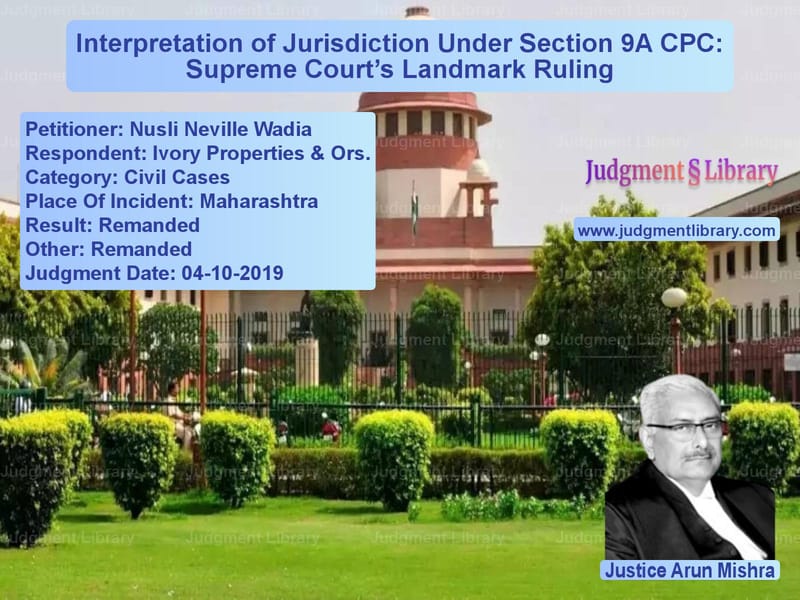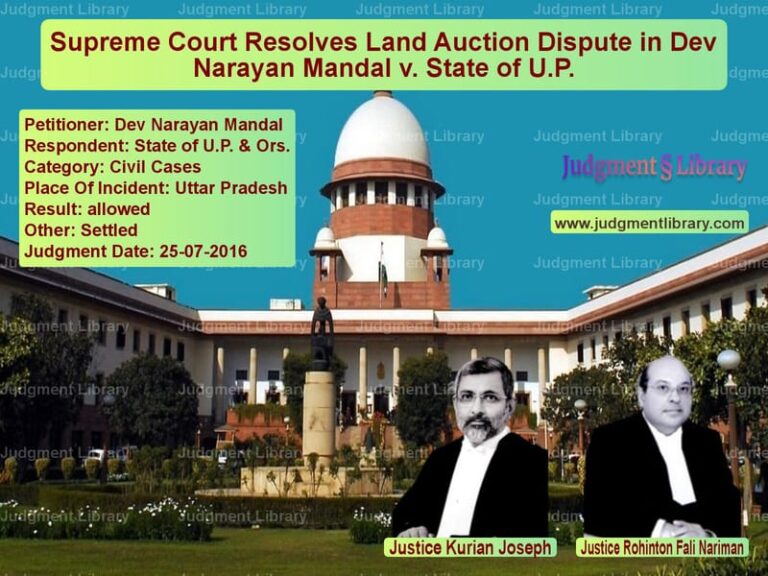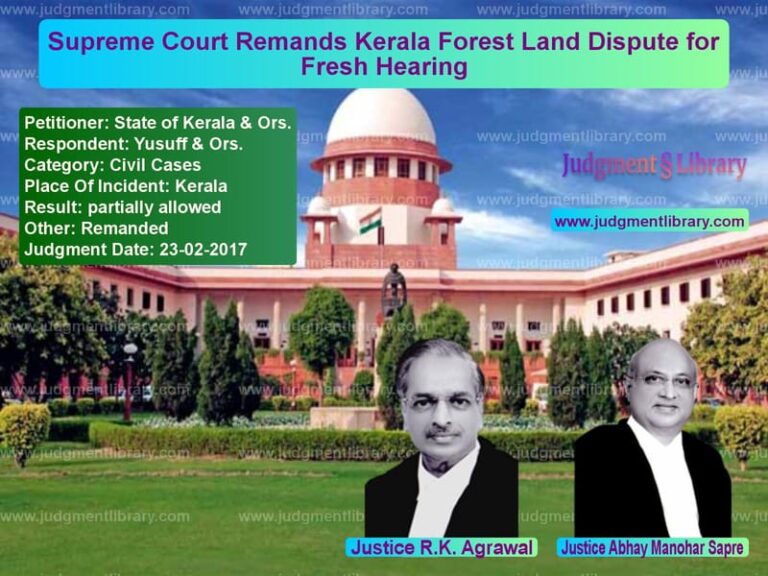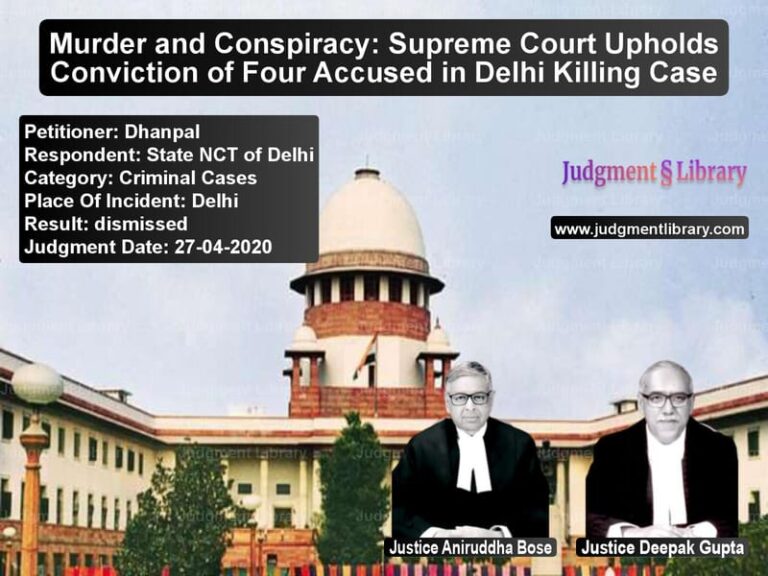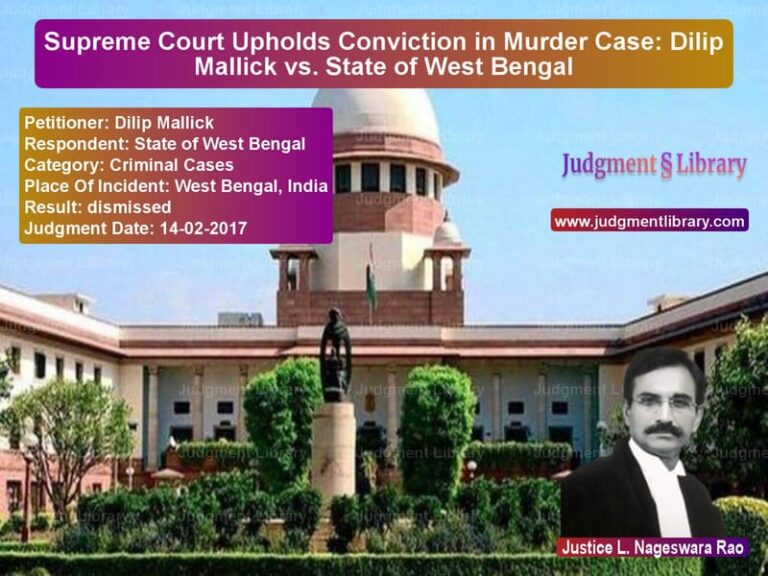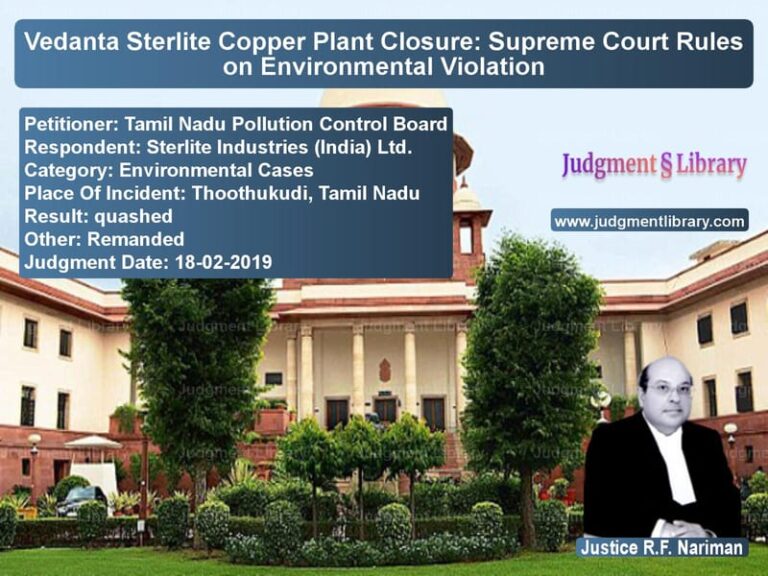Interpretation of Jurisdiction Under Section 9A CPC: Supreme Court’s Landmark Ruling
The case of Nusli Neville Wadia vs. Ivory Properties & Ors. presented an intricate legal question regarding the interpretation of Section 9A of the Code of Civil Procedure (CPC), as amended by the Maharashtra Amendment Act, 1977. The Supreme Court was tasked with determining whether the term ‘jurisdiction’ in Section 9A extends to include limitation as a preliminary issue. This ruling carries significant consequences for civil suits filed in Maharashtra and potentially other jurisdictions where similar procedural laws apply.
In civil proceedings, the concept of jurisdiction has traditionally been understood as the power of a court to hear a case, either on the basis of subject matter, pecuniary value, or territorial constraints. However, the question before the Supreme Court was whether this term could be broadly interpreted to include the issue of limitation. The judgment not only clarifies the scope of Section 9A but also addresses conflicts in prior decisions regarding the adjudication of limitation in civil suits.
Background of the Case
The dispute arose when the petitioner, Nusli Neville Wadia, filed a civil suit challenging the jurisdiction of the court in a property matter involving Ivory Properties & Ors.. The core issue was whether limitation could be decided as a preliminary issue before proceeding with the main suit.
Section 9A of the CPC, as introduced by the Maharashtra Amendment Act, 1977, states that when an objection to the jurisdiction of a court is raised, the court must decide it as a preliminary issue before proceeding further. However, conflicting judicial interpretations of what constitutes ‘jurisdiction’ under this provision led to this case being referred to a larger bench of the Supreme Court.
Petitioner’s Arguments
The petitioner, Nusli Neville Wadia, contended:
- The term ‘jurisdiction’ in Section 9A should be interpreted broadly to include limitation as a threshold question.
- The legal position laid down in Pandurang Dhondi Chougule v. Maruti Hari Jadhav supports the interpretation that jurisdiction includes issues affecting the competence of the court to proceed with the suit.
- Deciding limitation as a preliminary issue would enhance judicial efficiency by preventing the continuation of suits that are time-barred.
- Previous conflicting judgments, including Foreshore Cooperative Housing Society Ltd. v. Praveen D. Desai and Kamalakar Eknath Salunkhe v. Baburav Vishnu Javalkar, necessitated a clarification from the Supreme Court.
Respondent’s Arguments
The respondents, Ivory Properties & Ors., countered:
- The concept of ‘jurisdiction’ under Section 9A must be interpreted in a limited sense, referring strictly to the court’s power to hear the case.
- The judgment in Kamalakar Eknath Salunkhe correctly held that limitation cannot be treated as a jurisdictional issue under Section 9A.
- Expanding the meaning of jurisdiction would complicate procedural laws and lead to unnecessary delays in civil litigation.
- The present case was filed within the prescribed limitation period, making the petitioner’s challenge irrelevant.
Supreme Court’s Observations
The Supreme Court thoroughly analyzed the statutory framework and previous judgments before arriving at its decision. The Court made the following key observations:
“The term ‘jurisdiction’ as used in Section 9A should not be narrowly construed. It includes not only pecuniary and territorial jurisdiction but also objections that go to the root of the court’s competence to hear a matter.”
The judgment further elaborated:
- While Section 9A requires jurisdictional challenges to be decided as preliminary issues, the broader legislative intent suggests that limitation should also be adjudicated at this stage.
- The conflicting views in Foreshore Cooperative Housing Society Ltd. and Kamalakar Eknath Salunkhe require reconciliation, as both rulings have led to inconsistent applications in civil courts.
- Efficiency in legal proceedings mandates that suits barred by limitation should not proceed unnecessarily, as they waste judicial resources and prolong litigation.
Final Verdict
The Supreme Court ruled in favor of the petitioner and held:
- The issue of limitation can be adjudicated as a preliminary issue under Section 9A if it directly affects the court’s competence to hear the case.
- The decision in Kamalakar Eknath Salunkhe was overruled to the extent that it restricted the interpretation of ‘jurisdiction’ under Section 9A.
- The matter was remanded to the trial court to determine whether the suit was barred by limitation before proceeding with the case.
- The ruling sets a precedent for all civil suits in Maharashtra, ensuring that limitation challenges are decided at the earliest stage of litigation.
Implications of the Judgment
This judgment has far-reaching consequences for civil litigation in India:
- Clarification of Jurisdiction: The ruling clarifies that ‘jurisdiction’ under Section 9A includes limitation, thereby resolving inconsistencies in previous judgments.
- Judicial Efficiency: By allowing limitation to be determined at the preliminary stage, courts can avoid unnecessary trials and expedite the resolution of cases.
- Precedent for Future Cases: The judgment serves as a guiding principle for all civil courts in Maharashtra and other jurisdictions with similar procedural provisions.
- Impact on Legislative Reforms: The ruling may prompt amendments to the CPC, ensuring a uniform approach to handling jurisdictional objections nationwide.
Conclusion
The Supreme Court’s decision in this case reinforces the importance of judicial efficiency and procedural clarity. By ruling that limitation can be decided as a preliminary issue under Section 9A, the Court has set a precedent that will help streamline civil litigation and prevent unnecessary delays. This judgment provides much-needed guidance on the interpretation of jurisdiction in civil procedure, ensuring a fair and consistent approach to adjudicating limitation issues in the future.
Petitioner Name: Nusli Neville Wadia.Respondent Name: Ivory Properties & Ors..Judgment By: Justice Arun Mishra.Place Of Incident: Maharashtra.Judgment Date: 04-10-2019.
Don’t miss out on the full details! Download the complete judgment in PDF format below and gain valuable insights instantly!
Download Judgment: Nusli Neville Wadia vs Ivory Properties & O Supreme Court of India Judgment Dated 04-10-2019.pdf
Direct Downlaod Judgment: Direct downlaod this Judgment
See all petitions in Contract Disputes
See all petitions in Property Disputes
See all petitions in Consumer Rights
See all petitions in Debt Recovery
See all petitions in Landlord-Tenant Disputes
See all petitions in Judgment by Arun Mishra
See all petitions in Remanded
See all petitions in Remanded
See all petitions in supreme court of India judgments October 2019
See all petitions in 2019 judgments
See all posts in Civil Cases Category
See all allowed petitions in Civil Cases Category
See all Dismissed petitions in Civil Cases Category
See all partially allowed petitions in Civil Cases Category

